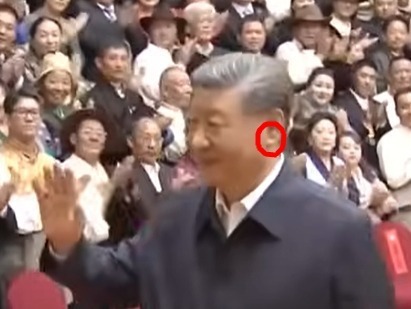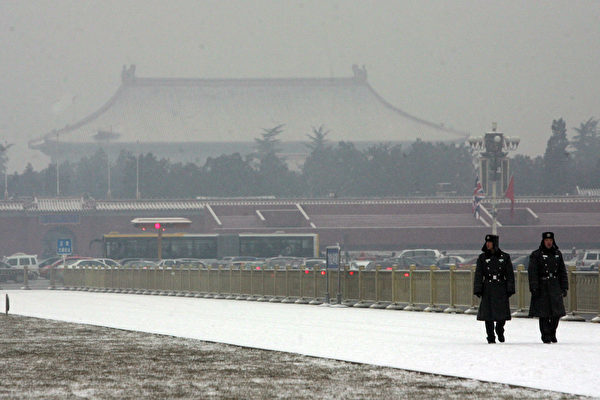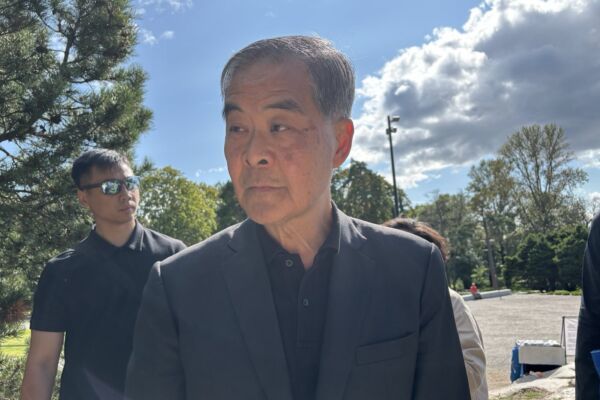Reference image: Protesters hold a legislative election day rally in Hong Kong. On September 6, 2020, riot police raised warning flags during anti-government protests in Hong Kong. Nearly 300 people were arrested during protests against the government's decision to postpone the Legislative Council election due to the newly implemented National Security Law. (Photo by Anthony Kwan/Getty Images)
[People News] The CCP authorities have announced the establishment of the first “Patriotic Education Base for Hong Kong and Macau Youth” in Beijing, sparking criticism that this is a forced brainwashing campaign targeting Hong Kong’s younger generation. Since adult Hongkongers experienced freedom and prosperity under British rule, they are largely anti-CCP and remain a chronic source of anxiety for Beijing. In fact, resentment toward the CCP—and even opposition to it—exists throughout China.
On August 21, the Hong Kong and Macau governments launched the first such “Patriotic Education Base” on the mainland. State media claimed this move was in line with Xi Jinping’s “important instructions,” making use of so-called “red resources” to set up more bases and organise study visits for Hong Kong and Macau youth.
The topic drew attention among Hongkongers and overseas netizens. They noted that once a dictatorship controls education and the media, it can easily control people’s minds—China and North Korea are prime examples. Many worried that through “patriotic education,” Hong Kong’s youth will be indoctrinated into “little pinks” (young nationalists). Over several years, Beijing could brainwash the next generation of Hongkongers from being “anti-CCP” to being “anti-colonial.”
Other commentators argued that with China’s economy declining, the CCP facing a governance crisis, and domestic social movements slowly emerging, Hong Kong may increasingly become a conduit for dissidents to connect with the outside world and exchange ideas. Put bluntly: if China experiences long-term social unrest and the regime lacks resources to suppress it, Hong Kong’s existing pro-democracy circles could transform into a new opposition force—or provide support in the form of expertise, manpower, supplies, and international connections to those attempting to build an alternative government. With this growing sense of crisis, Beijing is determined to dismantle the “one country, two systems” framework, no matter how blatant the move appears.
According to Epoch Times, Lin Song, a Hong Kong–born political science PhD at the University of New South Wales, said the CCP is tightening its grip on Hong Kong and Macau: “They believe Hongkongers and Macanese are not patriotic enough. But the definition of patriotism is very different. We say patriotism means love for the people of the country, but the CCP says patriotism means love for the Communist Party. That’s the key difference.”
Lai Jung-wei, executive director of the Taiwan Inspiration Association (TIA), told Epoch Times that Xi Jinping is copying Cultural Revolution–style methods in governing Hong Kong, in reaction to the shock of the 2019 anti-extradition movement.
In 2019, Hong Kong saw mass protests against the Extradition Bill, known as the Anti-ELAB movement. By October 31, 2022, Hong Kong police had arrested over 10,000 people in connection with the demonstrations. The CCP’s heavy-handed crackdown was seen as the most severe political crisis in Hong Kong’s history since its founding.
At this year’s Hong Kong Book Fair (July 16–22), Xi Jinping’s books in traditional Chinese were launched with a special promotional event. Yet a reporter who observed for nearly an hour found that despite prominent displays, not a single visitor picked one up.
Such indifference has deeply unsettled Beijing.
Lai commented that after the 2019 movement, Xi Jinping resolved to remake Hong Kong and Macau, allowing only “patriots” to govern. But older Hongkongers who lived under British openness and freedoms may strongly oppose the CCP and Xi. This generation, therefore, is a major source of anxiety for the regime. He added that Beijing’s forced indoctrination of youth is similar to the “re-education camp” model in Xinjiang—deliberately creating a divide between children and parents in thought and even behaviour, causing generational rifts. Such dehumanising policies, he warned, will only fuel greater social conflict.
In August 2022, China’s ambassador to France, Lu Shaye, told media that “after reunification with Taiwan, Taiwanese people will be re-educated.” Commentators at the time noted that the Xinjiang re-education model could be exported to Hong Kong and eventually Taiwan. If democratic nations fail to stop the CCP, its repression model could spread globally.
Lin Song emphasised that the crackdown on Hongkongers should serve as a warning for Taiwan: “The Taiwanese people must not fall into the CCP’s trap. Right now, its so-called patriotic education is already frightening Hongkongers and Macanese, driving more people to emigrate to escape Communist control.”
Lai further pointed out that the CCP’s strategy is “infiltration of the mind” from a young age—occupying children’s hearts before their identities are fully formed. Taiwan, too, is struggling with this kind of “red infiltration.” Through cross-strait exchanges, Beijing recruits local agents to attract Taiwanese teachers and students to visit China, even encouraging parents to bring their children to festivals like Dragon Boat. This youth-targeted united front strategy is being replicated over and over.
Lai concluded: Xi Jinping’s anxieties are not limited to Hong Kong and Macau. Across China, countless people are resentful of CCP rule. The Party’s “red expansion” is nothing more than digging its own grave. △









News magazine bootstrap themes!
I like this themes, fast loading and look profesional
Thank you Carlos!
You're welcome!
Please support me with give positive rating!
Yes Sure!